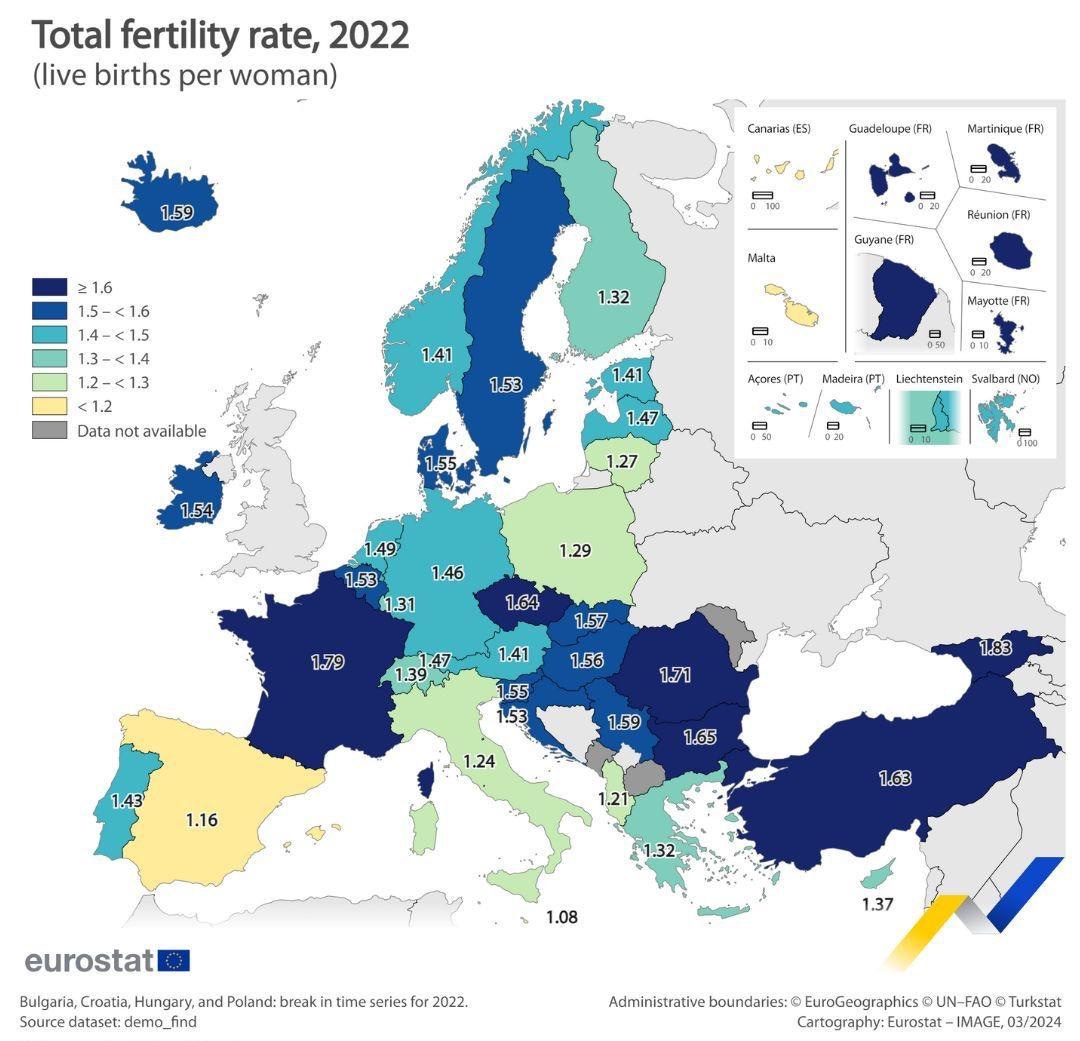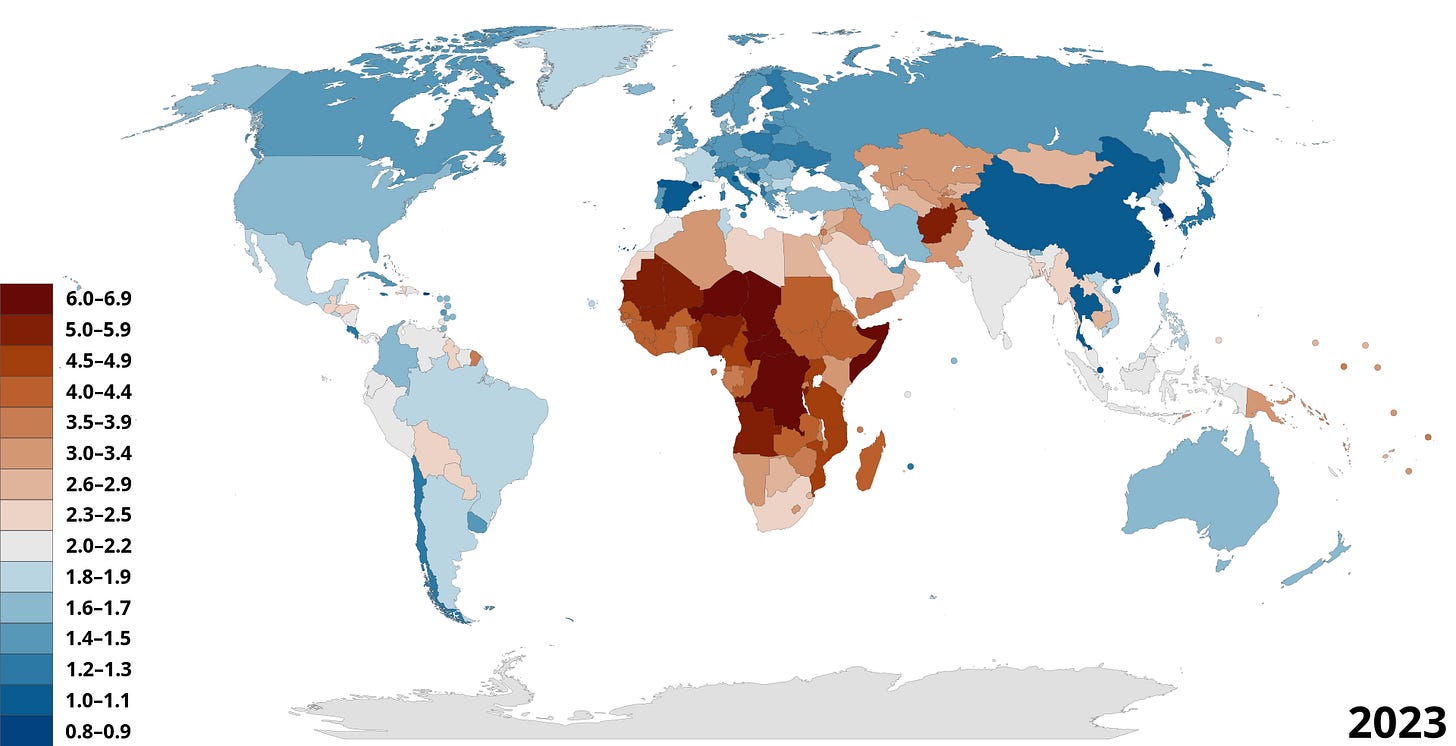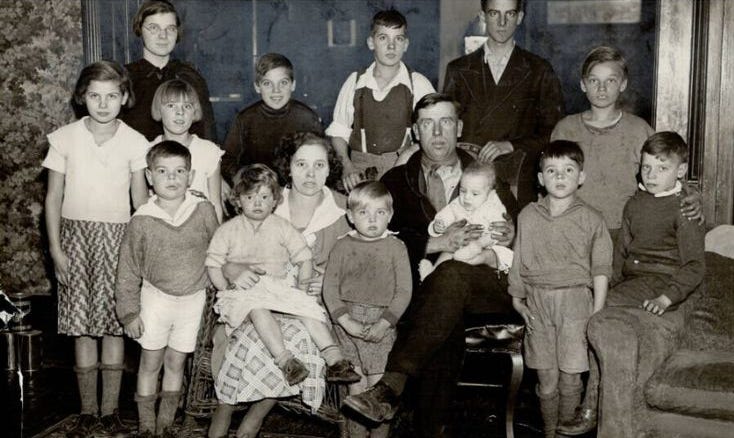The “Demographic Collapse” has become a common topic, where nations all over the world are staring down a potentially-catastrophic population decline caused by insufficient numbers of children.
All across the planet, fertility rates are plunging, seemingly irrespective of nation, culture, demographic, or economics. Modern medicine, with plunging infant and maternal mortality rates, seems to have, if anything, a negative effect on the birth rate. Only Africa has the distinction of a universally positive growth rate, where there are greater than 2.1 children per woman.
Why? Why aren’t people having children? It’s an open question. Well, reasons usually offered include:
Economics – It’s too expensive to have children, the parents aren’t economically stable enough or well enough off to afford kids.
Uncertainty – The times are turbulent and the future looks grim. Between political upheaval/instability, the looming threats of climate change, worries of economic crashes, layoffs, societal breakdowns, etc., it’s just not responsible to bring children into this world.
Relationship – Anything from not being able to find someone with whom you’d be willing to raise children or who’d be willing to do it with you, to wanting to preserve the relationship you have with your spouse/SO and not interrupt it with children. Everything from the “Forever Alone” or even “Incel” communities to the “Childfree” and broader movements that reject marriage or old relationship norms.
Rise of Prosperity – As nations get wealthier, their fertility rates go down, due to people postponing marriage, getting better access to birth control and contraception, readier access to abortion, and rise in gender equality that allows women to pursue careers rather than families.
Rising LGBTQ Demographics – over 20% of Gen Z is (reportedly) LGBTQ, which does not lend itself to having children (adoption doesn’t count for this metric). Greater and greater numbers of people are free to “come out”, which inevitably results in lower birth rates.1
Better Medicine – Before, people used to have to have lots of kids, because a bunch of them would die. But now, better medicine removes that need, so there’s no need to have more than you want – chances are, they’ll all make it.
The Internet and Social Isolation – People are lonely and isolated, thus getting together less, married less, and having fewer kids.
Birth Control, et al – Access to cheap, reliable birth control, as well as better education mean that people are having fewer “accidental” babies.
I would argue that only one of those is really to blame.
Imagine you have a time machine. Your task is to summon any of a thousand generations of your ancestors and try to explain to them why you’ve decided not to have children.

“I’m not having kids because we can’t afford it.” Or, “I don’t have healthcare.” Or, “The world sucks, I can’t bring a kid into it now.” Or even, “I just don’t want to.”
Presumably, after they stopped screaming and you were able to converse with them, their response would be to stare blankly at you and say, “Yeah….and?”
No one’s ever been able to afford children – the vast, vast majority of everyone who’s ever lived has been dirt poor. “Healthcare” just meant “your mom, sister, and/or grandma with hot water and rags,” or maybe some herbal salves – medicine as we know it is younger than some currently-living people. And most importantly, the world has always sucked. I doubt anyone wanted to bring children into the world during the Warring States Period or the Black Death or while they lived under the boot of some conquering despot. Anyone from before 1920 would probably chuckle and pat you on the head for thinking those objections mattered – pregnancy and childbirth were understood as something borderline inevitable.
After all, humans have always been just the way we are now: horny beyond all reason. Teenagers have been dumb and horny for time immemorial. Adults have been only slightly less dumb and horny for slightly longer. People were bored, a lot. Brains swimming in hormones have been making bad decisions since either have existed. Life usually sucked, regardless of time period, and people wanted the free shot of dopamine that comes with the horizontal tango.
Just those factors alone – to say nothing about the prevalence of slavery or rape in general – would mean just a constant stream of children.2 And since, across time and culture, you could expect around half of them to die before adulthood, it meant that every single woman needed to have four to five children, just to keep the population from shrinking. Spend 9 months pregnant, at least a year nursing – call it 2 years total – every woman on earth would spend a minimum of a decade of her life either pregnant or caring for an infant. And that’s just to ensure that 2 kids make it to adulthood to have kids of their own – the replacement rate. Throughout history, populations have grown pretty fast,3 so now you’re looking at 6+ kids per woman.
But these days, we’ve got modern medicine, so infant and childhood mortality has been reduced almost down to a rounding error. The modern West could almost get away with only having two kids each. The replacement rate is 2.1 kids per woman (since some % of the population will die childless or is infertile). But for the entirety of the developed world – and most of the developing world – that is still too big an ask. Why? Why, in this day and age of technological, medical, and scientific marvels, can we not accomplish even 1/3 of what our ancestors in mud huts did for millennia?
The answer: Birth Control. Its mere existence, being safe, cheap, effective, and available has doomed the fertility rate of the human species. And the disruption created by a $5 pack of condoms will take the might of entire industrialized economies, marshalled to a unified goal, in order to have a prayer of counteracting it.4
Why? Because it shifted the default setting for billions of people. Take a generic couple, married or not, but who are regularly sleeping together. What do we assume happens next?
Nothing. Maybe they get married, maybe they break up, maybe they end up with a dead bedroom, there’s no way to know from that bit of information alone. A man and woman regularly sleeping together is not a situation inherently on the cusp of anything. Because we assume they’re using some form of BC. Condoms, hormone pills, IUDs, a supply of Plan B pills, or if all else fails, a trip to the local Planned Parenthood clinic. That’s normal.
But to everyone who’s ever lived prior to the 1960s, that’s insane. Their assumption would be, “I hope she’s ready to get pregnant and he’s ready to marry her.” Because that’s what happens when people sleep together, especially if it’s on the regular. It’s inevitable. That’s the default. Or rather, it was.
Now, the default condition of people in a sexual relationship is…just that. The default thing to happen is that they’ll continue having sex and there won’t be any children involved unless they decide otherwise. Without modern BC, children are a normal and expected side effect of getting laid – that was the understood risk that you took. But with it, and with its use normalized – nay, expected – getting pregnant and having children is something that (the woman, at least) has to allow. Even if the BC fails, the siren song of the abortion clinic will beckon as soon as that positive test turns up, and for many people, that’s something that you have to turn down. That’s the normal response you take to a positive pregnancy test and choosing to have a baby means deliberately not going.
The modern world, thanks to ubiquitous BC methods, is one where having a child is an intentional action one must take, rather than the consequences foisted upon you by another action. People have gotten drunk or been thinking with their hormones for all time, made bad decisions under that influence, and the woman finds herself pregnant. Nature then runs its course. But following the advent of birth control, people (women, primarily, let’s be honest) can take precautions in sober mind (beforehand or the morning after) and only regret their choices last night because their hookup isn’t attractive without beer goggles. Worst case scenario, finding out you’re pregnant just means an unexpected expense for an abortion.
In the past, it only took a bad decision in the heat of the moment or while somewhat impaired to stick you with a baby; now, those impulsive decisions can be negated by a trip to the pharmacy. You have to make a decision in the cold, sober light of day to allow a pregnancy to both exist and continue.
Thus, it is no surprise that people are answering that choice in the negative. If we think about it in terms of the classic Pros/Cons list, the decision-making calculus creates an obvious result. Let’s start with the cons.
Most of them are so obvious, they almost don’t need to be said. The process of pregnancy sucks in a major way; it’s miserable, painful, uncomfortable, and aggravating. Childbirth raises that suckage to an exponent, wreaks significant damage on the mother’s body, and carries a not-insignificant risk of death. Sometimes the damage is permanent, sometimes it takes surgery to repair, and no matter what, you’re going to be healing and recovering for weeks, all the while being deprived of sleep by a screaming infant. In our modern day of safety equipment and medicine, it might be the most unpleasant thing most women experience in their lives (to that point).
Then there’s the money aspect. In addition to potentially-ruinous hospital bills, your insurance premiums are going up, as are your food, utility, and medical bills. Everything you already spend money on is gonna cost a little more. When the majority of people live paycheck-to-paycheck, where’s that extra supposed to come from?
Having a child is inherently taking on a quarter-century financial obligation – almost as long and about as expensive as another mortgage. You’ve got to feed, clothe, house, and care for this kid until the day they move out – and you’ll probably still be covering their health insurance until age 26. In ye olde times, it would only be 5, 6, 7 years before a kid could start pulling his weight on the farm and offer a net economic benefit to his family; now, unless you’re the tiny percentage of people who still operate a farm or run a small business (debatably even then), your child having a job is expressly forbidden by law. Their job, anyway, is to go to school and get an education, and maybe get a part-time gig in high school.5 Then there’s college, which, one way or another, is costing more money. After college, it’s almost a given the kid will move back home for a while, and maybe (given current trends) permanently.
It’s generally accepted that having a child is an investment in the future, but there’s not much ROI to be had here. Previous generations had kids, first for the extra farmhands and second, to distribute out the burden of caring for them when they got old and couldn’t work anymore. The ROI for their investment turned around pretty quickly. But in the modern US, any such return for the vast majority of people is forbidden by law for at least 14 years, and even after that, there aren’t many economically-meaningful ways for a teenager to contribute. Plus, attempting to do so will likely hamper their education and thus is detrimental to their future prospects; making your teen get a job to bolster his parents’ finances would be viewed incredibly negatively by those around you, and there are legal recourses for the kid, who can just keep the check to himself. Nothing obligates a child to “carry their weight” in a family (nor should there be, to be clear), or even to care for their parents in their old age.
We have retirement funds and social security. We’ve got nursing homes, home care workers, and Medicare. We don’t have to take care of our parents anymore because there are systems to do that instead.
So, what is the incentive supposed to be for most people to have children?
Especially early on, kids provide an extraordinary negative influence on every area of the parents’ lives.
Economic – babies cost a ton of money.
Temporal – babies take a lot of time and add a whole bunch of tasks to your day.
Physical – not only does birth take a toll on your body, but the ensuing sleep deprivation for years to come will age you rapidly and take a toll on your health.
Emotional – I don’t know any mothers who haven’t broken down in tears at some point because of how exhausted they were. Later on, children test your patience to the very limits (and then some).
Mental/Psychological – All that sleep deprivation doesn’t do nice things to your brain.
Social – Having kids costs you friends (childless friends don’t want to hang out with a baby) and ensures you don’t have time to hang out anyway. It’s often extremely lonely to be a parent.
Personal – You have hobbies? Not anymore.
Relational – Children quickly take precedence above everything else, including the parents’ relationship with each other.
We tally all that up…and what’s the pro side that has to balance all this out?
Fulfillment. Joy. Unconditional love. Legacy.
All great things, don’t get me wrong; the catch is that those are abstract and intangible. The downsides are all-too-tangible, things that are in your face and a part of your life, daily. And the benefits that are tangible – extra workers or caretakers in old age – are both far off (between 1 and 4 decades away) and unreliable (your kids can easily choose not to do them or just not be able to).
Again, why are we surprised that people are, en masse, weighing these factors and deciding to not have children? From a pragmatic, purely logical perspective, that’s the only sensible conclusion. Especially in a day and age of increased competition, record population, resource scarcity, climate disruptions, etc. etc. From an environmental and economic perspective, it’s necessary that people have less children in order to get back under “sustainable” levels. We went from 1 to 8 billion people on the planet in about a century – dropping back down would be a net positive for humanity and the planet.
Of course, it’s not that simple. Nothing ever is, isn’t it? For Exhibit A, take a look at China. They had the infamous One Child Policy for 30-odd years – most of a generation – in response to their rapidly accelerating population numbers. We can certainly understand why; they peaked at around 1.4 billion people. But now they’re faced with the opposite problem: population nosedive. The population of China is slated to more than halve by 2050 down to under 700 million.6 Their “fertility rate” – the number of children born per woman – is ~1.09, about exactly half of the replacement rate.7 South Korea, possibly the worst off in the world, came in at an astonishing 0.72 in 2023, a third of the replacement rate.
Just to put it in real life terms, that means that, for every 3 married couples, only two of them have a single child. Six people, two kids between them. Those 6 adults would have 24 parents and 96 grandparents. Ninety-six people, TWO great-grandchildren. Oof.
“But that’s a good thing for a couple generations, so we can get global population under control,” I hear you say. To which I’d answer, “the road to Hell is paved with good intentions.” The issue with the declining fertility rate isn’t environmental, economic, political, social, or (inherently) even religious: it’s practical. Specifically, that this is a trend that colors every facet of people’s lives and their life choices – those trends create an incredible amount of inertia. Sure, we might see net positives or necessity in “degrowth” as it’s often called, I won’t argue you there.
My only caution is, “How do you plan to stop?”
Returning to the example of China, they started dialing back their draconian one-child policy years ago. First, they upped it to Two Child, and most recently Three – not that that mattered. Segments of the Chinese government seemed to be under the impression that the reason people weren’t having more children is because the government had forbade it, rather than, y’know, all the things we’ve listed here, plus maybe a couple extra.
Funny thing, when you create a society – by government fiat or organically – that so drastically limits the birth rate, every other aspect of society shifts to accommodate it. Women can enter the workforce, thanks primarily to birth control, because they’re not basically-guaranteed to be pregnant before they turn 25. Because they can, many couples will opt for that as a way to get ahead economically; save up for a while, then have kids. But then standards of living adjust and, to keep up with those expectations, a two-income household is now normal…then it becomes mandatory. If couples with two incomes can’t get ahead like they wanted to to have kids, it’s easier to just keep doing what they’re doing and not have them rather than try to do without one salary or funnel money into childcare. Don’t hear me say that it’s women’s fault for wanting to work; the point is that birth control created that opportunity, and of course people are going to take it.
Then there’s the intangible potential field of Only Children. Now, I can only speak for myself as an Only Child, but I suspect that is a huge factor into why (for instance) China is struggling to raise its birth rate. China has an entire generation of nothing but Only Children (OC). Everyone under the age of 40, basically, has only ever known life as an OC. And growing up that way torpedoes your ability to have and raise children, because you have no idea how to deal with them. OCs are surrounded much of their lives by adults; they only live with adults and socialize much more heavily with adults. It’s much easier for two parents to control a single child and maintain some semblance of peace and quiet in the house, whereas multiple children raise the amount of inherent chaos exponentially.
I have 3 children now, and the difference between when I am somewhere with only one of them versus the 3 of them together is night and day. One-on-one, they are excellently behaved, models of polite and responsible actions (mostly). Together, they’re like trying to herd particularly unruly cats. Noise and chaos are the standard baseline of the house, a state which my OC-hood left me entirely unprepared to deal with. I’d never spent any meaningful time around a crying baby, had zero instincts for how to comfort upset infants, and was generally clueless about how to deal with them. Fortunately, my wife was an expert, and she’s spent the past several years teaching me along with the children.
Now imagine the average 20-something couple in China, both of whom are OCs, and so were their parents. They’ve lived in (relative) peace and quiet their entire lives. A screaming baby is an unfamiliar sound and probably makes them intensely uncomfortable, especially if it won’t stop (which is often). The chaos of a child radically disrupts every aspect of their lives, in ways that they are entirely unfamiliar with. Many of them probably look at their new parent friends and decide “the heck with that”, choosing instead to focus on their (demanding) careers and hobbies. Others have that first one and it’s such a shock to their systems — parents: how much worse is it if you don’t know what you’re doing? — that they look at one another and go, “Never again.”
So what do we do? It’s not as simple as just telling people “Have more children,” nor is it something that can be resolved with monocheeked8 incentives. How do you convince people with a litany of good, valid reasons to ignore all of them and have kids?
“Make having children more affordable,” is the first suggestion that usually comes up. But it’s not gonna happen. Why? Because societies don’t solve problems that they don’t have.
We can argue that things like hospital care, parental leave, childcare, formula, diapers, etc. are prohibitively expensive and that people look at the costs of raising children and decide against it; that’s a problem that needs to be solved. But we, as a society, already have: the solution is, “Don’t have one.” We resolved the problem of children being prohibitively expensive by using cheap birth control to let people avoid having children if they can’t afford it – see: how contraceptive pills are automatically covered, even by terrible health insurance.
If you want to make having children cheaper/more affordable, that’s only going to be precipitated by tons of people with children they can’t support – thus creating the problem that needs to be resolved. But even then, that’s usually addressed by half-measures like WIC and food stamps, subsidizing the bare minimums to keep it from being an outright crisis. Hospital costs coming down is only going to come from too many parents getting bankrupted by the bills, or too many women and babies dying at home because they couldn’t afford the hospital. I don’t think that anyone wants the kinds of death and misery it would require to force those issues.
Conversely, we can just look at western Europe — and specifically, at any of the Scandinavian countries. Norway, Sweden, and Finland have everything that, if economics were the real issue, would make for an exploding population: robust social programs, parental leave requirements, vacation time, subsidized daycare, tons of oil wealth, and long winters that trap everyone inside. But, quite tellingly, while they don’t have the worst birth rates in Europe, they’re certainly no better than the continent as a whole. If anything, the social programs that American leftists regularly call for are anti-indicators; they coincide with lower birth rates, not higher.

Incentives – tax credits, paid parental leave, daycare vouchers, etc. – simply aren’t going to work. See the pros and cons list above – incentives might be a tipping point for people who are on the fence, but for the wide majority who are deliberately rejecting the call to have children, it’s not going to do it. There are too many downsides to having 3+ children, a few financial incentives aren’t enough to balance them out, not by a long shot. Especially when you’re talking about sacrificing one parent’s entire income – those incentives don’t come close to making up for that.
So, what are the possible solutions? Near as I can figure, there are really only two that stand a chance of working.9
One, simply banning birth control. No contraceptives, no condoms, no Plan Bs, and no abortions. (Obviously, this is a terrible idea in addition to being impractical, see: Romania.) Given the ubiquity of existing methods, how easily a meaningful supply of BC could be smuggled into a country (there’s already existing pipelines for other drugs, what’s a few more?), it would be something that only a handful of countries on earth could hope to pull off.
Frankly, I’m expecting this attempt from China. Wildcard option: Japan or South Korea.10 Places that culturally refuse to offset birth rates with immigration and so might attempt this out of sheer desperation. China has the necessary state control apparatus to make a decent attempt at it, and it’s exactly the sort of authoritarian solution that they would enact.
Of course, this is going to come with a laundry list of unintended consequences, like a rise of outright infanticide, feeding a black market and the organized crime that goes with it, dead or maimed women from attempting DIY abortions or BC, an explosion in the number of abandoned children for state orphanages, and economic catastrophe from tons of people going broke. But hey, it’d be an easy solution for the government to mandate, so that’s probably what will ensure someone tries it.
Option two is simply, pay women to be mothers. This is what I meant earlier that a $5 pack of condoms will require entire industrialized economies to counter. Because having children creates such a dramatic list of negatives, the only logical way to overcome them is by creating a benefit that outweighs them. This goes beyond mere “incentivizing,” like tax credits, because that’s merely meant to offset the magnitude of the negatives, not counter them. This means “making motherhood a career,” one that pays enough to make it worth doing for enough women. One where sacrificing one income from a two-income house will more-or-less break even, or even come out ahead.
Quick author’s caveat: as someone who’s occasionally accused of having libertarian sympathies, I don’t actually think this is a good idea, just that it’s the only thing that’s likely to work (without, y’know, subjecting millions to death and misery). If the goal is to raise birth rates back above replacement, this is probably the only way to do so in a way that doesn’t require some even more dystopian scenario. Like, say, the general collapse of industrialized society making birth control unavailable by default – in that case, we’ve got bigger problems.
“But,” I hear someone object, “the absence of birth control was how humanity functioned for its entire existence, why can’t we just go back to that? Why can’t we just roll things back and let society do the things it’s always done at the local scale?”
To which I respond: Sure, we could. It is possible. But in the same way that I could allow myself to be shot in the gut as a way to get a vacation and catch up on my sleep.11 I could, but I won’t. Sure, it would solve a problem that I have and is (temporarily) detrimental to my health, but as a solution, it would be so painful – and liable to cause other, unforeseeable and long-term problems – that it’s not worth it.
Modern, industrialized, (predominantly) Western society has spent the last 3-4 generations remaking itself to what it is today, often by discarding the things that made the previous arrangements work. For the US in particular, it would mean the complete overhaul of every town and city in the country in a way that “economically calamitous” would be too mild a descriptor. For most people, putting more than one child in daycare is going to cost more than mom makes at work, especially when you consider the extra time and labor involved in doing the rest of life.
You’ve still got to shop for food and household supplies, clothes still have to be washed, meals have to be cooked (or bought, for an increasing premium), the house still has to get cleaned and maintained, and kids still have to do their homework, get a bath, and get to bed, all in the few hours that you’ve got after getting off work. Splitting the household duties between mom and dad just means you’re both burnt out; it physically cannot replace someone who’s home all day, who handles those things as their job. I know more than one family who’ve looked at the numbers and decided that it just wasn’t worth it for both parents to be working – a conclusion I’d imagine a lot more people would come to if they all of a sudden found themselves with a couple extra kids. So, all at once, you’d see millions of women drop out of the workforce, already when there’s a labor shortage from all the Boomers retiring.
Second, just from a practical side, remember during the beginning of the COVID-19 pandemic, when hospitals and medical facilities were completely overwhelmed by the sheer number of patients? I’m envisioning that again, but this time with a flood of pregnant women, because the hypothetical cut-off for BC would be inevitably followed by an enormous spike in the number of pregnancies. So, get ready for a ton of dead women and dead babies, because there’s already not enough OB-GYNs to go around now.
Third, the entire way the country is physically laid out would have to be scrapped and revamped. It’s waaaaaay too spread out for “the old ways” to function. Why? Because most of the people I know live 30-60 minutes away from their workplace. Any Millennial who’s bought a house in the past decade or two probably lives a good distance away from everything. I’m 15-20 minutes away from most any store and a good half-hour away from any of my friends or family. Now, granted, this is near Baltimore, so half an hour around here could mean like 2 miles in the horrendous traffic, but that doesn’t make it any faster. Point being, I can’t call someone to hang out for like an hour, or come swing by the house to watch the kids while I run a quick errand, because just the trip there and back might take a whole hour, to say nothing of what has to be done there. Arranging for someone to come over, or to visit them, is a complex, often futile task, because it’s automatically a multi-hour commitment and everyone is already busy.
The ”old ways” of caring for children requires not only a robust community, but one that’s physically available. I can have the best friends and family in the world, but if we can’t afford the time or gas to get together, they might as well be a collection of chatbots. It means having parents and grandparents living nearby – and not still working because they can’t afford to retire yet – who can watch the kids for a few hours on the regular, or tank some sleep deprivation in the night so mom can catch up. How many people do you know who live close enough to their parents for them to just pop over, impromptu? If the answer isn’t “most of them”, that’s a problem.
The point is, all the old social structures that civilization came with have been largely supplanted by modernity. Restoring them would require such an unthinkable amount of rearranging — of homes, of living arrangements, of familial relationships, of city planning, etc. — that if it is possible at all, it’s going to be the work of generations to carry out.
In the meantime? If you want to have enough people to run modern nations in a couple of decades, you’re probably going to have to start a New Deal-esque program that hires millions of people. But instead of something like the Civilian Conservation Corps or the Works Progress Administration, it’s going to be a couple million women whose actual, paying job is to be a mom (and pays enough to be preferable to other employment).
And if we don’t want to cause another economic crisis by pulling tons of women out of the workforce, we should probably get started before all the Boomers retire.
Exactly how much this affects birth rates is debatable; a closeted gay man probably isn’t having that many children, either.
Even if two people *only* had sex once a month, over a 20-year stretch, that’s 240 times. Lowballing the odds of pregnancy to 1/30 (one day per month), statistically, that’s 8 pregnancies. Probably 4-6 children, just from a minimum level of married horniness.
Y’know, before a war or plague broke out that sent it plummeting back down. We tend to look at the population growth charts and assume they were just low. But while overall populations tended to stay fairly low through history, that’s just due to averaging; individual ones seem to have rebounded fairly quickly after being devastated. Dopamine to the rescue again.
Don’t take anything I’m about to say as meaning “we need to eliminate birth control,” because we shouldn’t and we can’t. Trust me, I understand its usefulness and importance. But even the most useful and necessary things can create some pretty big problems.
Nobody bats an eye at a farmer’s kid working out in the field to generate profits that he’ll never see, but it would be unthinkable for a teenager to get a job at McDonalds, but have his paycheck direct deposited into dad’s bank account. We’d regard that as borderline or outright abuse and theft. But why is one an accepted way for a child to contribute to their household, but not the other?
That works out to approx. 28 million people dying every year, which is an insane number to think about. In 2023, it was reported that only 7.88 million children were born, before being promptly censored. But even the official numbers are only 9.02 million.
Again, according to the official government numbers. However, given how the CCP is infamous for “fudging” numbers at every level, it’s likely much worse than that.
Mono- meaning “one”, and cheek meaning “not the ones on your face.”
Not a good one, mind you. Nor does that mean “work well.” Only “successfully reverse the demographic nosedive.”
Or the United States, depending on whether or nor the GOP implodes, or gains control of the government again.
I’ve been chronically sleep deprived for over 4 years now – there is a level of exhaustion where hospitalization starts to sound like a decent idea.















